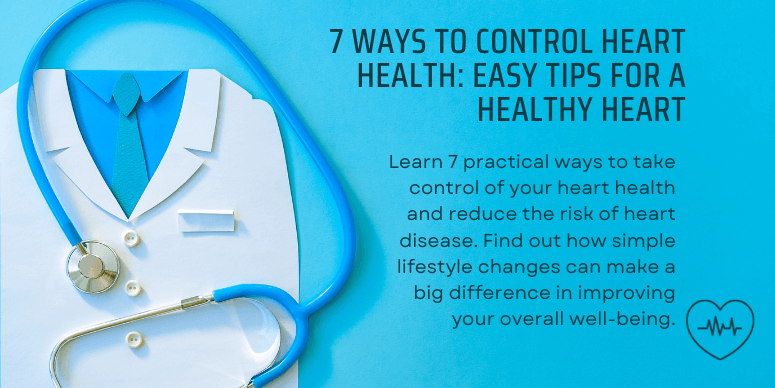[vc_row][vc_column][vc_column_text]
Introduction
Ensuring heart health is crucial for overall well-being and preventing heart disease. By adopting simple lifestyle changes, you can significantly improve your heart health and reduce the risk of cardiovascular issues.
Ways to Improve Heart Health
Eat a Heart-Healthy Diet
Consuming a balanced and nutritious diet is key to maintaining a healthy heart. Opt for foods that are low in saturated and trans fats, and high in fiber. Include a variety of fruits, vegetables, whole grains, and healthy protein sources, mainly from plants.
Engage in Regular Physical Activity
Being physically active is vital for cardiovascular health. Aim for at least 30 to 60 minutes of moderate-intensity exercise daily. It can help lower blood pressure, improve cholesterol levels, and maintain a healthy weight.
Practice Stress Management Techniques
Chronic stress can negatively impact heart health. Incorporate stress-reducing activities into your routine, such as meditation, deep breathing exercises, or engaging in hobbies that bring you joy.
Maintain a Healthy Weight
Excess weight puts strain on the heart and increases the risk of heart disease. Focus on achieving and maintaining a healthy weight through a combination of a balanced diet and regular physical activity.
Get Regular Check-ups
Regular check-ups with your healthcare provider are essential for monitoring your heart health. They can help detect any potential issues early on and provide guidance on maintaining optimal cardiovascular well-being.
Limit Alcohol Consumption
Excessive alcohol consumption can have detrimental effects on heart health. If you choose to drink, do so in moderation. The recommended limit is up to one drink per day for women and up to two drinks per day for men.
Prioritize Quality Sleep
Adequate sleep is crucial for overall health, including heart health. Aim for 7-9 hours of quality sleep each night. Establish a relaxing bedtime routine and create a sleep-friendly environment.
Conclusion
In conclusion, incorporating these seven heart health tips into your lifestyle can help you take control of your cardiovascular well-being. By practicing a heart-healthy diet, engaging in regular physical activity, managing stress, maintaining a healthy weight, seeking regular check-ups, moderating alcohol consumption, and prioritizing quality sleep, you can reduce the risk of heart disease and improve your overall health.
FAQs:
1. Q: What are the best ways to maintain heart health?
A: The best ways to maintain heart health include adopting a heart-healthy diet, engaging in regular physical activity, managing stress, maintaining a healthy weight, getting regular check-ups, moderating alcohol consumption, and prioritizing quality sleep.
2. Q: How can I prevent heart disease?
A: Preventing heart disease involves practicing a heart-healthy lifestyle, such as following a balanced diet, staying physically active, managing stress, maintaining a healthy weight, and avoiding smoking and excessive alcohol consumption. Regular check-ups with a healthcare provider are also essential for early detection and prevention.
3. Q: Are there natural remedies for a healthy heart?
A: While lifestyle changes play a significant role in heart health, there are some natural remedies that may support cardiovascular well-being, such as incorporating garlic, omega-3 fatty acids, and hawthorn into your diet. However, it’s important to consult with a healthcare professional before adding any supplements to your routine.
4. Q: How often should I get my heart checked?
A: It is recommended to have regular check-ups with your healthcare provider to monitor your heart health. The frequency may vary depending on your age, medical history, and risk factors. Generally, it is recommended to have a check-up at least once a year.
5. Q: Can stress affect heart health?
A: Yes, chronic stress can have a negative impact on heart health. It can contribute to high blood pressure, increased heart rate, and unhealthy coping behaviors like overeating or excessive alcohol consumption. Implementing stress management techniques, such as meditation, exercise, and relaxation techniques, can help reduce the impact of stress on your heart.[/vc_column_text][/vc_column][/vc_row]




